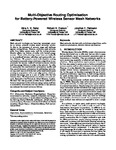Multi-objective routing optimisation for battery-powered wireless sensor mesh networks
| dc.contributor.author | Rahat, AAM | en |
| dc.contributor.author | Everson, RM | en |
| dc.contributor.author | Fieldsend, JE | en |
| dc.date.accessioned | 2018-10-19T19:58:05Z | |
| dc.date.available | 2018-10-19T19:58:05Z | |
| dc.date.issued | 2014-01-01 | en |
| dc.identifier.isbn | 9781450326629 | en |
| dc.identifier.uri | http://hdl.handle.net/10026.1/12585 | |
| dc.description.abstract |
Mesh network topologies are becoming increasingly popular in battery powered wireless sensor networks, primarily due to the extension of network range and resilience against routing failures. However, multi-hop mesh networks suffer from higher energy costs, and the routing strategy directly affects the lifetime of nodes with limited energy sources. Hence while planning routes there are trade-offs to be considered between individual and system-wide battery lifetimes. We present a novel multi-objective routing optimisation approach using evolutionary algorithms to approximate the optimal trade-off between minimum lifetime and the average lifetime of nodes in the network. In order to accomplish this combinatorial optimisation rapidly and thus permit dynamic optimisation for self-healing networks, our approach uses novel k-shortest paths based search space pruning in conjunction with a new edge metric, which associates the energy cost at a pair of nodes with the link between them. We demonstrate our solution on a real network, deployed in the Victoria & Albert Museum, London. We show that this approach provides better trade-off solutions in comparison to the minimum energy option, and how a combination of solutions over the lifetime of the network can enhance the overall minimum lifetime. © 2014 ACM. | en |
| dc.format.extent | 1175 - 1182 | en |
| dc.language.iso | en | en |
| dc.title | Multi-objective routing optimisation for battery-powered wireless sensor mesh networks | en |
| dc.type | Conference Contribution | |
| plymouth.publication-status | Published | en |
| plymouth.journal | GECCO 2014 - Proceedings of the 2014 Genetic and Evolutionary Computation Conference | en |
| dc.identifier.doi | 10.1145/2576768.2598311 | en |
| plymouth.organisational-group | /Plymouth | |
| plymouth.organisational-group | /Plymouth/Faculty of Science and Engineering | |
| plymouth.organisational-group | /Plymouth/REF 2021 Researchers by UoA | |
| plymouth.organisational-group | /Plymouth/REF 2021 Researchers by UoA/UoA11 Computer Science and Informatics | |
| dc.rights.embargoperiod | Not known | en |
| rioxxterms.versionofrecord | 10.1145/2576768.2598311 | en |
| rioxxterms.licenseref.uri | http://www.rioxx.net/licenses/all-rights-reserved | en |
| rioxxterms.type | Conference Paper/Proceeding/Abstract | en |


